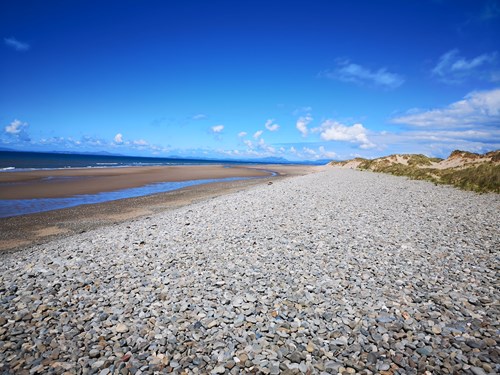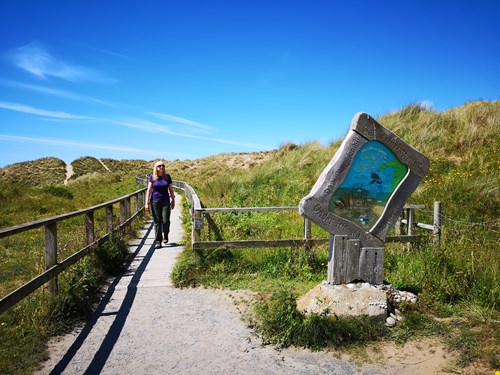Beddgelert Forest, near Beddgelert
Huge forest in the heart of Eryri (Snowdonia)...

Morfa Dyffryn National Nature Reserve is one of the most important dune systems in Wales because of its bare sand and wildlife habitats.
Dunes like these with bare sand areas are becoming increasingly rare. The wind constantly moves and reshapes the dunes and they provide a home for rare and highly specialised plants and animals.
As well as the huge sand dunes, there are areas of seashore, saltmarsh and grassland and each of these habitats is home to an amazing variety of wildlife.
Together with Morfa Harlech to the south, the two reserves form an almost continuous area of sand dunes along the coastline.

There are two walking routes from the car park on Ffordd Benar through the reserve to the beach.
The wooden boardwalk from the car park goes straight to the beach.
The path from the car park goes through the dune slacks and onto the open beach.
On a clear day enjoy views of the Llŷn Peninsula and a glimpse of Bardsey Island from this stretch of the Cardigan coast.
There is a viewpoint with picnic bench at the beach end of the boardwalk and there are picnic tables in the car park.
Please note that part of the reserve is a designated naturist beach and is signed accordingly.
Please keep dogs on leads during the bird breeding season March – July; ringed plovers nest right on the beach and other birds nest in the dunes and saltmarsh.
Morfa Dyffryn is a National Nature Reserve.
National Nature Reserves are places with some of the very finest examples of wildlife habitats and geological features.
The landscape and wildlife varies depending on which time of year you visit – here’s what to look out for.

This is a good time to see many of the flowering plants that grow in the dune grasslands and slacks.
Several nationally rare and scarce wildflowers, lichens and mosses make their home here. The wild orchids include the lovely marsh helleborine which grows alongside the northern marsh-orchid as well as the early marsh-orchid.
There is a whole host of other brightly coloured wildflowers to enjoy from early spring onwards. Thrift and common centaury put in an early appearance and they are soon followed by other coastal species including common restharrow, wild pansies, bird's-foot trefoil and many others.
You might also come across sea mouse-ear, thyme-leaved sandwort, portland spurge and dune fescue.
Lapwing nest here and ringed plovers breed on areas of shingle.
In the warmer months, a wide variety of flowering plants can be seen in the dune grasslands and slacks. These include dune pansy, speedwells, thyme, maiden pink and orchids.
There are also colonies of the rather scarce green-flowered helleborine and round leaved wintergreen - July or August is the best time to see this species.
Summer is also a busy time for many invertebrates including mining bees and beetles.
Look out for the small copper, peacock, and gatekeeper butterflies and day-flying moths such as the cinnabar and forester.
The drier dune grasslands are well known as good habitat for fungi and the dunes here offer impressive fungi 'vistas'.
Dwarf earthstar occurs only in mature dune grasslands such as those found at Morfa Dyffryn.
You may also see multi-coloured waxcaps, coral and club fungi, earthtongues and parasols.
The sand flats and salt marsh in the estuary are important feeding grounds for winter wildfowl.
The beach is used by wading birds but, if you look offshore, you may spot wintering grebes and divers.
Other bird species that put in an appearance at the reserve in winter include choughs and hen harriers.
There are over 70 National Nature Reserves in Wales.
Find out more about National Nature Reserves.
Morfa Dyffryn is in Eryri (Snowdonia) National Park.
Eryri is the largest National Park in Wales and is home to picturesque towns and villages and the highest mountain in Wales.
It is looked after by the Eryri National Park Authority.
For more information about visiting Eryri go to the Eryri National Park Authority website.
We want you to return home safely after your visit here.
You are responsible for your own safety as well as the safety of any children and animals with you during your visit.
Please note:
For advice and tips to help you plan your visit here go to Visiting our places safely.

The boardwalk is flat and wide and suitable for wheelchairs.
The boardwalk is owned by Eryri (Snowdonia) National Park.
See the top of this webpage for details of any planned closures or other changes to visitor facilities here.
For your safety, always follow instructions from staff and signs including those for trail diversions or closures.
We may divert or close trails whilst we undertake maintenance work or other operations and we may need to close other visitor facilities temporarily.
In extreme weather, we may close facilities at short notice due to the risk of injury to visitors and staff.
You may need permission from us to organise an event or to carry out some activities on our land.
Check if you are allowed to use our land.
Morfa Dyffryn National Nature Reserve is 5 miles north of Barmouth.
The postcode is LL44 2HA.
Please note that this postcode may not take you to the car park if you use a sat nav or navigation app.
We suggest you follow the directions below or use the Google map on this page which has a pin on the car park’s location.
Take the A496 from Barmouth to Harlech.
After the village of Tal y Bont, turn left at the brown sign to the Dyffryn Seaside Estate and Benar Beach.
The car park is at the end of this single track lane (Ffordd Benar) on the left after the Dyffryn Seaside Estate.
View this place on the What3Words website.
The Ordnance Survey (OS) grid reference for the car park is SH 572 227 (Explorer Map OL 18).
The nearest mainline railway station is in Dyffryn Ardudwy.
There is a bus service from the south (Barmouth) and north (Harlech) along the A496.
For details of public transport go to the Traveline Cymru website.
The main access to Morfa Dyffryn National Nature Reserve is via the car park on Ffordd Benar.
The car park is operated by Eryri National Park Authority and there is a parking charge.
For information about opening times and parking charges go to the Eryri National Park Authority website.
There are no staff at this location.
Contact our customer team for general enquiries during office hours, Monday to Friday.